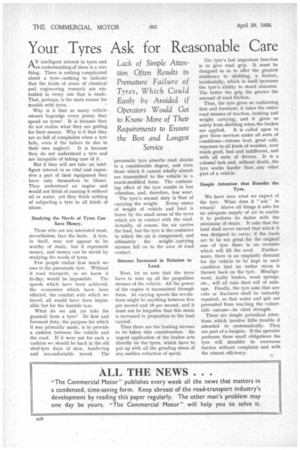Your Tyres Ask for Reasonable Care
Page 38

If you've noticed an error in this article please click here to report it so we can fix it.
Lack of Simple Attention Often Results in Premature Failure of Tyres, Which Could Easily be Avoided if Operators Would Get to Know More of Their Requirements to Ensure the Best and Longest AN intelligent interest in tyres and an understanding of them is a rare thing. There is nothing complicated about a tyre—nothing to indicate that the fruits of years of chemical and engineering research are embodied in every one that is made. That, 'perhaps, is the main reason for trouble with tyres. Why is it that so many vehicle owners begrudge every penny they spend on tyres? It is because they do not realize what they are getting for their money. Why is it that they are so full of complaints when a tyre fails, even if the failure be due to theirown neglect? It is because they do not understand a tyre and are incapable of taking care of it.
But if they will not take an intelligent interest in so vital and expensive a part of their equipment they have only themselves to blame. They understand an engine and would not think of running it without oil or water, yet they think nothing of subjecting a tyre to all kinds of abuse.
Studying the Needs of Tyres Can Save Money.
Those who are not interested must, nevertheless, face the facts. A tyre, in itself, may not appear to be worthy of study, but it represents money, and money can be saved by studying the needs of tyres.
Few people realize how much we owe to the pneumatic tyre. Without it road transport, as we know it to-day, would be impossible. The speeds which have been achieved, the economies which have been effected, the comfort with which we travel, all would have been impossible but for the humble tyre. What do we ask (or take for granted) from a tyre? Its first and foremost duty, the purpose for which it was primarily made, is to provide a cushion between the vehicle and the road. If it were not for such a cushion we should be back in the old steel-tyre days of slow, lumbering and uncomfortable travel. The pneumatic tyre absorbs road shocks to a considerable degree, and even those which it cannot wholly absorb are transmitted to the vehicle in a much-modified form. The cushioning effect of the tyre results in less vibration, and, therefore, less wear.
The tyre's second duty is that of carrying the weight. Every ounce of weight of vehicle and load is borne by the small areas of the tyres which are in contact with the road. Actually, of course, the air carries the load, but the tyre is the container in which the air is compressed, and ultimately the weight -carrying stresses fall on to the area of road contact.
Stresses Increased in Relation to Load.
Next, let us note that the tyres have to take up all the propulsion stresses of the vehicle. All the power of the engine is transmitted through them. At varying speeds the revolutions might be anything between five per second and 10 per second, and it must not be forgotten that this stress is increased in proportion to the load carried.
Then there are the braking stresses to be taken into consideration. An urgent application of the brakes acts directly on the tyres, which have to put up with all the grinding stress of any sudden reduction of speed.
The tyre's last important function is to give road grip. It must be designed so as to offer the greatest resistance to skidding, a feature, incidentally, which in itself increases the tyre's ability to stand abrasion. The better the grip the greater the amount of road friction.
Thus, the tyre gives us cushioning first and foremost; it takes the entire road stresses of traction, braking and weight carrying; and it gives us safety from skidding when the brakes are applied. It is called upon to give these services under all sorts of conditions—intense heat, great cold, exposure to all kinds of weather, over roads good, bad and indifferent, and with all sorts of drivers. It is a colossal task and, without doubt, the tyre works harder than . any other .part of a vehicle.
Simple Attention that Benefits the Tyre.
We have seen what we expect of the tyre. What does it " ask " in return? Above all things it asks for an adequate supply of air to enable it to perform its duties with the minimum of strain. It asks that the load shall never exceed that which it was designed to. carry; if the loads are to be too great for the original size of tyre there is an oversize which will fill the need. Furthermore, there is an emphatic demand for the vehicle to be kept in such condition that no undue stress is thrown back on the tyre. Misalignment, faulty brakes, weak springs, etc., will all take their toll of mileage. Finally, the tyre asks that any cuts or fractures shall be instantly repaired, so that water and grit are prevented from reaching the vulnerable carcase—its chief strength.
These are simple periodical attentions which involve little trouble if attended to systematically. They are part of a bargain. If the operator performs these small obligations the tyre will shoulder its enormous burden without complaint and with the utmost efficiency.






















































































